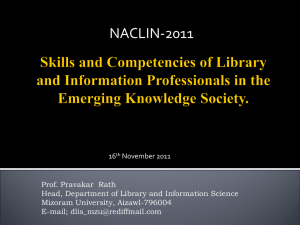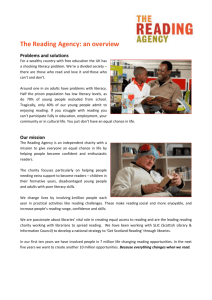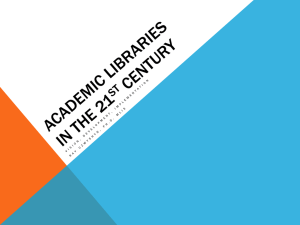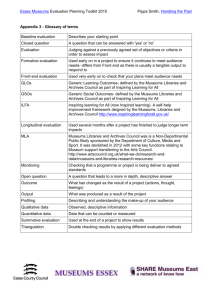TRA national reading offer work on evidencing outcomes
advertisement
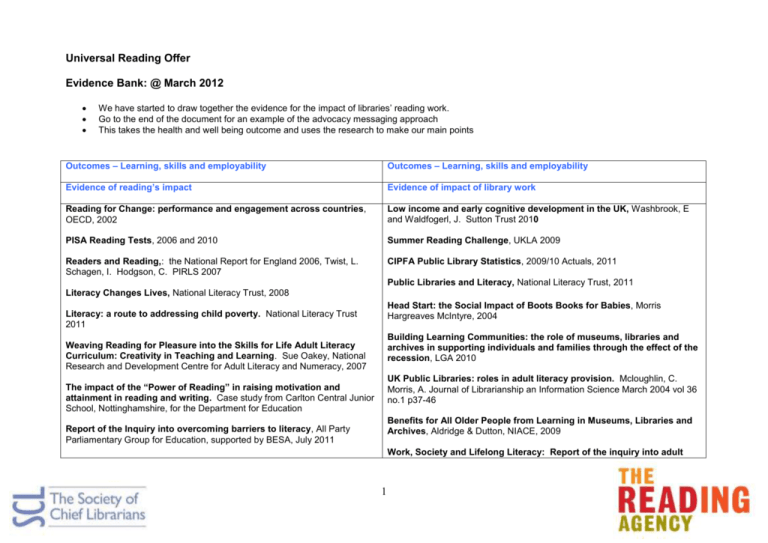
Universal Reading Offer Evidence Bank: @ March 2012 We have started to draw together the evidence for the impact of libraries’ reading work. Go to the end of the document for an example of the advocacy messaging approach This takes the health and well being outcome and uses the research to make our main points Outcomes – Learning, skills and employability Outcomes – Learning, skills and employability Evidence of reading’s impact Evidence of impact of library work Reading for Change: performance and engagement across countries, OECD, 2002 Low income and early cognitive development in the UK, Washbrook, E and Waldfogerl, J. Sutton Trust 2010 PISA Reading Tests, 2006 and 2010 Summer Reading Challenge, UKLA 2009 Readers and Reading,: the National Report for England 2006, Twist, L. Schagen, I. Hodgson, C. PIRLS 2007 CIPFA Public Library Statistics, 2009/10 Actuals, 2011 Public Libraries and Literacy, National Literacy Trust, 2011 Literacy Changes Lives, National Literacy Trust, 2008 Head Start: the Social Impact of Boots Books for Babies, Morris Hargreaves McIntyre, 2004 Literacy: a route to addressing child poverty. National Literacy Trust 2011 Building Learning Communities: the role of museums, libraries and archives in supporting individuals and families through the effect of the recession, LGA 2010 Weaving Reading for Pleasure into the Skills for Life Adult Literacy Curriculum: Creativity in Teaching and Learning. Sue Oakey, National Research and Development Centre for Adult Literacy and Numeracy, 2007 UK Public Libraries: roles in adult literacy provision. Mcloughlin, C. Morris, A. Journal of Librarianship an Information Science March 2004 vol 36 no.1 p37-46 The impact of the “Power of Reading” in raising motivation and attainment in reading and writing. Case study from Carlton Central Junior School, Nottinghamshire, for the Department for Education Benefits for All Older People from Learning in Museums, Libraries and Archives, Aldridge & Dutton, NIACE, 2009 Report of the Inquiry into overcoming barriers to literacy, All Party Parliamentary Group for Education, supported by BESA, July 2011 Work, Society and Lifelong Literacy: Report of the inquiry into adult 1 Investigating the role of language in children’s early educational outcomes, Sue Roulstone, James Law, Robert Rush, Judy Clegg, Tim Peters Department for Education June 2011 Research Report DFE 134 ISBN 9781847759467 literacy in England. NIACE, 2011 Parenting matters: early years and social mobility, Chris Paterson, Centre Forum 2011 Book Ahead programme evaluation, Report to MLA, funded by DCFS, ERS, Sept 2009 Boys into Books Programme evaluation, Report to MLA funded by DCSF, ERS, 2009 Building a society for all ages: benefits for older people from learning in museums, libraries and archives. Aldridge, F and Dutton, Y. NIACE 2009 British Cohort Study, Oxford University, http://www.ox.ac.uk/media/news_stories/2011/110804 Confidence All Round, Morris Hargreaves Mcintyre, 2005 Recent trends in UK prison libraries. Bowe, C. Library Trends vol 59. no 3 (2011 Winter) p 427 This Cultural and Sporting Life: Taking Part 2010/11 Adult and Child Report, DCMS 2011 Literacy, State of the Nation, NLT, 2010 Bookstart Theoretical Framework – provides evidence to demonstrate the benefits of sharing, books, stories and rhymes for children. Booktrust Taking Part, child survey Arts Council 2008/9 HeadSpace Report, Reading Agency, 2008 Cultural Education in England: an independent review by Darren Henly for DCMS and DFE. DCMS 2012 Six Book Challenge evaluations, Reading Agency Local authorities improving life chances: a review of a new approach to raising literacy levels. McCoy, E. National Literacy Trust, 2011 Understanding the drivers, impacts and value of engagement in culture and sport: an overarching summary of the research. The Culture and Sport evidence programme, July 2010, DCMS Outcomes – Health well being and quality of life Outcomes – Health well being and quality of life Evidence of reading’s impact Evidence of impact of library work The Future of Reading, A Public Value Project, Creative Research, ACE, 2009 A National Library Development Programme for Reading Groups, The Reading Agency, 2005 2 The effectiveness of bibliotherapy in increasing the self-management ability of slightly to moderately frail older people, Patient Education and Counselling 61 (2006) , Frieswijk, D. Capturing the Impact of Libraries, BOP Consulting for DCMS, 2009 The State of Happiness Report: can public policy shape people’s wellbeing and resilience? Young Foundation and IDeA, 2010 Literacy Changes Lives, National Literacy Trust, 2008 Public library activity in the areas of health and well-being, Hicks, D Creaser, C Greenwood, H et al MLA 2010 Patterns of receptive and creative cultural activities and their association with perceived health, anxiety, depression and satisfaction with life among adults: the Hunt Study, Norway, Journal of Epidemiology and Community Health, May 2011 The Leisure Role of Libraries: Users’ Views. Hayes and Morris Journal of Library and Information Science 37 (3), 131 – 139 Partnerships for Patients Project Report, LISU, 2008 Liverpool Health Inequalities Research Institute, An investigation into the therapeutic benefits of reading in relation to depression and well-being, The Reader Organisation, 2010 Read Yourself Well. Nother, Maria. Public Libraries Journal vol 26, no 1 pp 20-21 Spring 2011 ISSN 0268-893X Get into Reading as an intervention for common mental health problems: exploring catalysts for change. Dowrick, C, Billington J, Robinson J et al. Med Humanities published online February 18 2012, doi: 10.1136/medhum-2011-010083 Contributing to health and well-being: reading remedies. Hicks, D, Brumwell, J. and Hodgkins, L. Library and Information Update pp 38-41, August 2010 ISSN 1476-7171 Arts, Health and Wellbeing Evaluation Development. Final report summary Derbyshire Arts Partnership 2010 Value and impact of Reading Imaginative Literature, Usherwood, B. Toyne, J. Journal of Librarianship and Information Science, March 2002, Vol 34, no 1 pp33 – 41 Play it by ear. Reading Groups for VIPs. Hyder, E. Public Library Journal Vol 23 no 2 Summer 2008 pp16 – 18 Evidence Review of BOP and Creative Bibliotherapy Projects in Libraries, Journal of Psychiatric and Mental Health Nursing, 2008, (15), 24-36 A reading revolution on the Wirral. Davis, J, Tomkins, J., Roberts, S. Public Library Journal Autumn 2008 pp 25 – 28 Cultural attendance and public mental health – from research to practice. O’Neill, M. Journal of Public Mental Health vol 9, issue 4 2010 pp 22-29 Leisure Activities and the Risk of Dementia in the Elderly, New England Journal of Medicine, 2003, 384:2508-2516 Bibliotherapy as a Means of Delivering Psychological Therapy, Neil Frude, Clinical Psychology (39), 8-10, 2004 Chatterbooks evaluation reports, Reading Agency 2008+9 Literacy Changes Lives, NLT, 2008 Bookstart Theoretical Framework – provides evidence to demonstrate the 3 benefits of sharing, books, stories and rhymes for children. Booktrust Reading the Situation: Book reading, buying and borrowing habits in Britain. Book Marketing League/TRA 2000 LISC Research report 34 ISBN 1873517769 Mindlab Report, Dr David Lewis, Mindlab International, University of Sussex 2009 Outcomes – Stronger and safer communities, including community participation Outcomes – Stronger and safer communities, including community participation Evidence of reading’s impact Evidence of impact of library work Literacy Changes Lives, NLT, 2008 Summer Reading Challenge Volunteering Report, Reading Agency Paper vs Electronic, The Green Reading Debate at www.justmeans.com Volunteering in libraries data in CIPFA Public Library Statistics, 2009-10 Actuals, 2011 Relevant repositories of public knowledge? Perceptions of libraries, archives and museums in modern Britain. Usherwood, B Wilson, K and Bryson, J BL Research and Development Dept, University of Sheffield 2006 Realising the potential of cultural services – the case for libraries. F Coalter LGA 2001 Research briefing 12.1 p8 CIPFA Statistics 2010-11 estimates Multiple community use/ recycling of library books Greening Interlibrary Loan Practices at www.oclc.org The Green Library Movement: An Overview and Beyond at Electronic Green Journal, 1 (27) at http:/escholarship.org/uk/item/39d3v2 www.greenlibraries.org 4 What the Public Want from Public Libraries? MLA, 2010 Reading Groups in Libraries Mapping Survey Findings, The Reading Agency, 2008 Impact evaluation of Museums, Libraries and Archives: available evidence project. Wavell, C, Gaxter, G, Johnson, I, Prof Williams, D. Resource, 2002 Outcomes – Economic impact/value for money Outcomes – Economic impact/value for money Evidence of reading’s impact Evidence of impact of library work Bookstart: Investing in the future of all our children 2010 SRC £1 a child – six times cheaper than authorities doing it on their own. Value of partners’ investment Bookstart 2009/10: A Social Return on Investment analysis. Just Economics 2010 for Booktrust. What do the public want from libraries? User and non-user research MLA/Ipsos MORI/Shared Intelligence 2010 New directions in social policy: developing the evidence base for museums, libraries and archives in England, BOP Consulting for MLA 2005 Paying the Price: the cost of mental health care in England to 2006. McCrone P, Dhanasiri S, Patel A, et al Kings Fund 2008 Public libraries in the knowledge economy. Clayton, N Hepworth, M 2006 MLA Bolton’s Museums, Libraries and Archives Services: an economic valuation, Jura Consultants for MLA 2005 Long-term conditions and mental health. The cost of co-morbidities. Naylor C, Parsonage M, McDaid, D et al. The Kings Fund and Centre for Mental Health February 2012 LH revised 15.3.12 5 Health Evidence and Advocacy Strategy Sample health advocacy messages drawn from shared national evidence base. Reading improves health and wellbeing • Reading is stress busting. Research shows that reading can reduce stress levels by 67 % (University of Sussex) • An ageing population means levels of dementia are predicted to rise by 61 % by 2026 (Kings Fund). Reading can help prevent the onset of dementia by 35% (New Eng. Jnl Medicine) • Bibliotherapy increases the self-management ability, mental agility and health literacy of older people (Patient Education and Counselling, 61) • Books on Prescription is an effective tool for delivering psychological therapy (Clinical Psychology, 39) • Social activities based on reading (reading groups/ author events) combat isolation and bring people together Libraries have a key role to play • Libraries offer important health and well-being services to the public and health partners: health information, therapeutic reading and social/recreational reading activities. ( Public Library Health Mapping Research) • There are at least 10,000 library linked reading groups (TRA Mapping Data) 6


